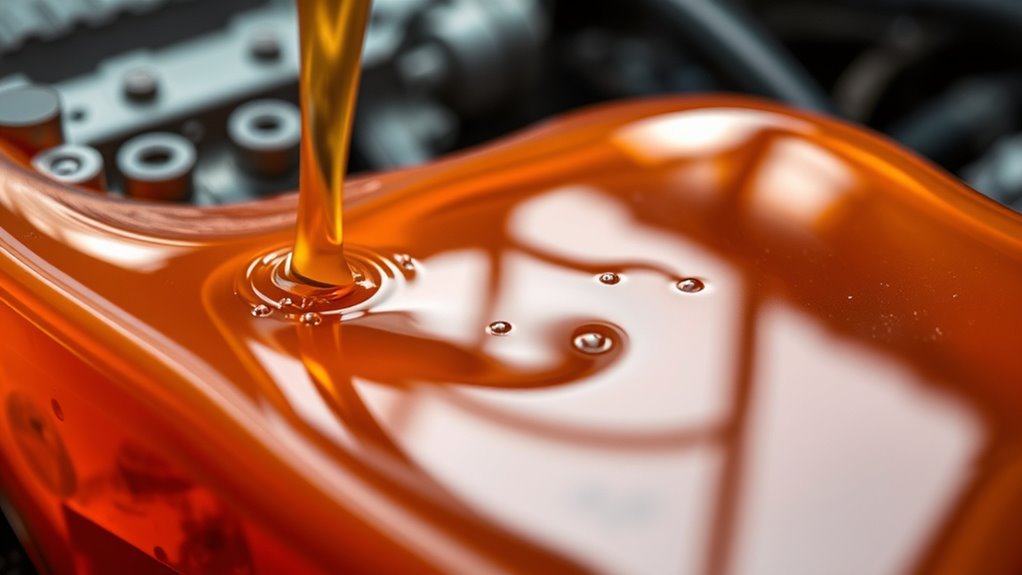Hybrid transmission fluids are specially designed to handle the unique demands of vehicles combining traditional gear systems with electric motors. They guarantee smooth operation, protect against wear and corrosion, and perform well under fluctuating temperatures and loads. These fluids include advanced additives that manage electrical conductivity and thermal stability, helping maintain efficiency and extend component life. If you want to learn more about how these fluids work and their benefits, keep exploring the details.
Key Takeaways
- Hybrid transmission fluids are specially formulated to support both mechanical gear components and electric motor systems.
- They help reduce friction, prevent corrosion, and ensure smooth operation of hybrid vehicle transmissions.
- Designed to perform reliably under variable temperatures and loads typical of hybrid driving conditions.
- Contain advanced additives that manage electrical conductivity and inhibit deposit buildup.
- Using the correct fluid extends component life, maintains efficiency, and prevents costly transmission damage.

Hybrid transmission fluids are specially formulated to meet the unique demands of hybrid vehicle transmissions, which combine traditional gear sets with electric motor components. Unlike conventional automatic transmission fluids, hybrid transmission fluids must accommodate the complex interplay between mechanical and electric systems. The electric motor, a core component of your hybrid vehicle, relies on the right fluid to guarantee smooth operation and longevity. Proper fluid compatibility is vital because it ensures that the fluid interacts seamlessly with both the electric motor and the transmission’s mechanical parts. When the fluid is compatible, it helps reduce wear, prevent corrosion, and maintain peak performance across a wide range of operating conditions.
In hybrid systems, the electric motor often assists or even replaces some functions of the traditional transmission, especially during low-speed driving or acceleration. This means the transmission fluid must perform well under fluctuating loads and temperatures. If the fluid isn’t compatible with the electric motor’s components, it can lead to increased friction, overheating, and eventual damage. That’s why manufacturers specify particular formulations designed to work in tandem with electric motor systems, guaranteeing minimal degradation over time. Fluid compatibility isn’t just about mixing well; it’s about maintaining the delicate balance between electrical and mechanical parts, preventing chemical reactions that could compromise performance. When you choose the correct hybrid transmission fluid, you’re helping your vehicle sustain its efficiency, reduce emissions, and extend the lifespan of key components.
Additionally, hybrid transmission fluids often contain advanced additives tailored to the needs of electric motor-equipped transmissions. These additives help manage electrical conductivity and prevent the buildup of deposits, which could interfere with the electric motor’s operation. They also help improve thermal stability, allowing the transmission to operate smoothly even under high-temperature conditions generated during intensive driving or hot climates. Since electric motors generate less heat than traditional engines, you might assume cooling isn’t as critical, but the transmission still needs a fluid that can handle the unique thermal profile of hybrid systems. Choosing a fluid specifically designed with electric motor compatibility in mind ensures your hybrid vehicle maintains peak performance, avoids costly repairs, and operates quietly and efficiently. Furthermore, the use of specialized fluids can help optimize fuel efficiency and reduce environmental impact over the vehicle’s lifespan.
Frequently Asked Questions
How Often Should Hybrid Transmission Fluids Be Replaced?
You should replace your hybrid transmission fluid according to the recommended replacement schedule, which typically ranges every 30,000 to 60,000 miles. Check your vehicle’s owner’s manual for specific fluid change intervals, as they can vary by model. Regularly maintaining these fluid levels guarantees smooth operation and prevents costly repairs, so don’t ignore the suggested intervals and keep up with your vehicle’s maintenance for peak performance.
Can Hybrid Transmission Fluids Be Used in Traditional Vehicles?
No, hybrid transmission fluids generally can’t be used in traditional vehicles due to hybrid compatibility and fluid interchangeability issues. These fluids are specially formulated for hybrid systems, which combine electric motors and internal combustion engines. Using the wrong fluid can lead to transmission damage or reduced performance. Always check your vehicle’s manual and use the recommended fluid to guarantee proper function and longevity of your transmission.
What Are the Signs of Failing Hybrid Transmission Fluid?
Did you know that nearly 60% of hybrid transmission failures are linked to fluid issues? If your hybrid transmission fluid shows signs like strange noises, slipping, or overheating, it’s likely due to fluid degradation or contamination issues. You might also notice a burnt smell or dark, gritty fluid. Regularly checking and replacing your fluid can prevent these problems, keeping your hybrid running smoothly and avoiding costly repairs.
Are There Synthetic Options for Hybrid Transmission Fluids?
Yes, synthetic formulations are available for hybrid transmission fluids. These synthetic options offer better fluid compatibility with various transmission components, ensuring ideal performance and longevity. They typically provide improved thermal stability, better lubrication, and reduced wear compared to conventional fluids. When choosing a synthetic hybrid transmission fluid, make sure it’s compatible with your vehicle’s specifications to prevent any potential issues and maximize the benefits.
How Does Climate Affect Hybrid Transmission Fluid Performance?
Climate variability and temperature impact hybrid transmission fluid performance substantially. When temperatures are high, the fluid can thin out, reducing its lubricating ability and risking overheating. Conversely, cold weather thickens the fluid, making shifting harder and increasing wear. You should choose a fluid formulated for your climate, ensuring it maintains ideal viscosity and protection across temperature extremes. Regular checks help prevent performance issues caused by climate-related temperature fluctuations.
Conclusion
Now you see how hybrid transmission fluids protect, lubricate, and cool your vehicle’s delicate components. They ensure smooth shifting, prevent wear, and extend your transmission’s life. With proper maintenance, you keep your hybrid running efficiently, quietly, and reliably. Think of it as the lifeblood that keeps your car moving forward, just like a steady heartbeat. By understanding these fluids, you’re empowered to care for your vehicle, guaranteeing it performs at its best, mile after mile.









